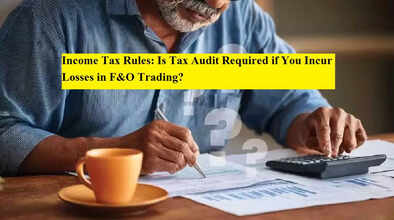Income Tax Rules: Is Tax Audit Required if You Incur Losses in F&O Trading?

Over the last few years, participation in the stock market’s Futures and Options (F&O) segment has surged significantly. However, many investors remain unclear about how income tax rules apply to profits and losses from F&O trading. One of the most common questions is whether a tax audit becomes mandatory if an investor suffers losses in the F&O market.
How F&O Income Is Classified Under Tax Laws
According to Section 43(5) of the Income Tax Act, derivative transactions carried out in the F&O segment are not treated as speculative income. Instead, both profits and losses from F&O are categorized as non-speculative business income, even though no actual delivery of shares takes place.
This classification is crucial because it allows F&O losses to be set off against other business income. Additionally, any profit earned from F&O trading is taxed as per the individual taxpayer’s applicable income tax slab.
When Is a Tax Audit Required?
Whether you need a tax audit depends primarily on the turnover of your F&O transactions.
-
A tax audit becomes mandatory if the turnover exceeds ₹1 crore.
-
If more than 95% of business transactions are conducted digitally, the turnover threshold for mandatory audit increases to ₹10 crore.
-
The deadline for completing a tax audit is September 30. Failure to meet this deadline may attract penalties amounting to 0.5% of turnover or ₹1.5 lakh, whichever is lower.
Is Audit Required in Case of Losses?
A key clarification provided by tax experts is that merely incurring losses in F&O trading does not automatically make tax audit mandatory. Chartered Accountant Pratibha Goyal explained on social media that an F&O loss, in itself, is not sufficient reason to trigger an audit requirement.
However, there is one important exception. If a taxpayer has opted for the Presumptive Taxation Scheme under Section 44AD in previous years but now wishes to report a loss (or declare profits lower than the presumptive rate), they must exit the scheme. In such a case, a tax audit becomes compulsory.
Understanding Section 44AD
Section 44AD is applicable to resident individuals, Hindu Undivided Families (HUFs), and partnership firms. It allows eligible taxpayers with a turnover of up to ₹2 crore to declare income on a presumptive basis.
-
Normally, income is assumed to be 8% of turnover.
-
If turnover is up to ₹3 crore and receipts through digital means do not exceed 5%, the presumptive rate can be 6% of turnover.
This simplified scheme reduces compliance but comes with strict conditions.
Rules for Opting Out of Section 44AD
Once a taxpayer chooses the presumptive scheme, they are required to continue under it for at least five years. If they exit the scheme earlier, they cannot opt back into Section 44AD for the next five assessment years.
Tax expert Balwant Jain explained: “If a taxpayer under Section 44AD later claims that their actual profit is lower than the presumptive rate, they must maintain proper books of accounts and undergo a tax audit, provided their total income exceeds the basic exemption limit.”
Key Takeaways for F&O Traders
-
Profits and losses in F&O are treated as non-speculative business income.
-
Tax audit is required only if turnover crosses ₹1 crore (₹10 crore for mostly digital transactions).
-
Losses alone do not trigger a tax audit.
-
Opting out of Section 44AD presumptive taxation may require an audit, subject to conditions.
Final Word
For retail traders and investors, understanding the tax implications of F&O trading is just as important as trading strategies themselves. While profits are taxed as regular business income, losses can be adjusted against other business gains. A tax audit is only mandatory under specific circumstances—primarily high turnover or exit from the presumptive taxation scheme.
With the growing popularity of derivatives trading, staying compliant with income tax rules helps traders avoid penalties and ensures smoother filing of returns. Consulting a qualified tax advisor is recommended for anyone actively trading in F&O markets.

